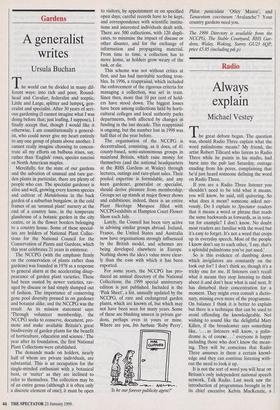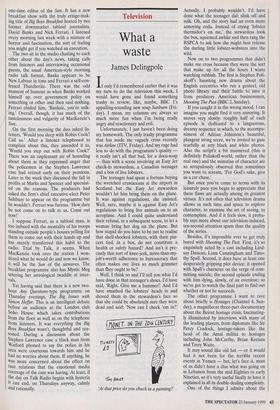Radio
Always explain
Michael Vestey
The great debate began. The question was, should Radio Three explain what the word palindrome means? My friend, the artist Robert Tilleard who listens to Radio Three while he paints in his studio, had burst into the pub last Saturday, outrage exuding from his pores, complaining that he'd just heard someone defining the word on Radio Three.
If you are a Radio Three listener you shouldn't need to be told what it means, you will know, he said, still quivering. So what does it mean? someone asked ner- vously. Do I explain to Spectator readers that it means a word or phrase that reads the same backwards as forwards, as in rota- tor for example? I don't know. No doubt most readers are familiar with the word but it's easy to forget. It's not a word that crops up in everyday speech. Most of the people I know don't say to each other, 'I say, that's a splendid palindrome you've just used.'
So is this evidence of dumbing down which invigilators are constantly on the look out for? I don't think so, though it's a tricky one for me. If listeners can't recall what it means they stop listening to think about it and don't hear what is said next. It has disturbed their concentration for a moment. They might even consult a dictio- nary, missing even more of the programme. On balance I think it is better to explain but there is a technique that can be used to avoid offending the knowledgeable. Not wishing to sound like the delightful Mary Killen, if the broadcaster says something like, `... as listeners will know, a palin- drome is, of course ...' everyone is happy including those who don't know the mean- ing. They will be conscious that Radio Three assumes in them a certain knowl- edge and they can continue listening with- out the need to look it up.
It is not the sort of word you will hear on Britain's only independent national speech network, Talk Radio. Last week saw the introduction of programmes brought in by its chief executive Kelvin MacKenzie, a one-time editor of the Sun. It has a new breakfast show with the truly cringe-mak- ing title of Big Boys Breakfast hosted by two former downmarket tabloid journalists, David Banks and Nick Ferrari. I listened every morning last week with a mixture of horror and fascination, the sort of feeling you might get if you watched an execution.
The two sit in the studio chatting to each other about the day's news, taking calls from listeners and interviewing occasional guests, the usual American-style morning radio talk format. Banks appears to be New Labour in tone and Ferrari a self-con- fessed Thatcherite. There was the odd moment of humour as when Banks worked himself up over government policy on something or other and then said nothing. Ferrari chided him, `Banksie, you're sulk- /ing.' Overall, though, it has much of the tastelessness and vulgarity of MacKenzie's Sun.
On the first morning the duo asked lis- teners, 'Would you sleep with Robin Cook? Call us.' After a listener telephoned to complain about this, they amended it to, `Would you step out with Robin Cook?' There was an unpleasant air of hounding about them as they expressed anger that the policemen in the Stephen Lawrence case had retired early on their pensions. Later in the week they discussed the fall in profits at Marks and Spencer and speculat- ed on the reasons. The producers had asked the firm's chief executive-elect Peter Salsbury to appear on the programme but he wouldn't. Ferrari was furious. 'Howdare he not come on to talk to us. Come out now!'
I suppose Ferrari, as a tabloid man, is too imbued with the mentality of his troops standing outside people's houses yelling for them to come out with their hands up and has merely transferred this habit to the radio. Trial by Talk, it seems. When MacKenzie took over the station I won- dered what he would do and now we know; it will be the Sun of the airwaves. The breakfast programme also has Mystic Meg uttering her astrological twaddle at inter- vals.
Yet having said that there is a new two- hour Any Questions-type programme on Thursday evenings, The Big Issues with Simon Heifer. This is an intelligent debate before an audience at the London club Soho House which takes contributions from the floor as well as on the telephone from listeners. It was everything the Big Boys Breakfast wasn't, thoughtful and rea- soned. During a discussion about the Stephen Lawrence case a black man from Watford phoned to say the police in his area were courteous towards him and he had no worries about them. If anything, he was more concerned about the effect on race relations that the emotional media coverage of the case was having. At least, if the day on Talk Radio begins with hysteria it can end, ' on Thursdays anyway, calmly and rationally.



























































 Previous page
Previous page